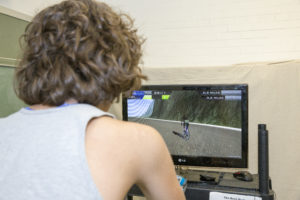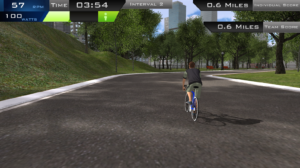
Keeping up one’s physical fitness is a battle for anyone, but trying to stay fit in outer space, where living quarters are cramped and the exercise regimen is rigorous and monotonous, is an extra challenge. Exercise is extremely important during space travel because prolonged weightlessness decreases muscle strength, bone density, and cardiovascular functioning. Motivation and adherence to high intensity exercise, coupled with a socially isolating environment with atypical access to social support, may be compromised. Exercising with a partner can help with motivation, but that is not possible for astronauts where space and exercise equipment is limited. Even using earth-based virtual partners is impractical due to reduced communication and scheduling, especially the further one goes into deep space.

Our research grant from the National Space Biomedical Research Institute of NASA is exploring the best ways to keep astronauts motivated to exercise when they go on long-duration space flights by using an exercise-video game (exergame) with a software-generated partner–one that is anthropomorphic but clearly artificial and synthetic. Our software-generated partner incorporates group-dynamics principles (behaviors and psychological processes occurring within, or between, social groups), such as upward social comparison and indispensability to group achievement, to address lack of motivation for vigorous physical exercise (i.e., the level of effort).
Of course, we can’t conduct our research with astronauts themselves at this stage, so have recruited men and women, ages 35 to 62 (the average age of an astronaut is 48), who were as physically healthy as astronauts, to test our exergame and software-generated partner.

We are using an exergame that involves a stationary bike, where individuals exercise on a variety of bike trails with or without a software-generated partner, under high-intensity interval training conditions. The partner is programmed to be slightly superior to the exerciser (upward social comparison) and to be a teammate, where the team score (exercise effort) is based on the weaker partner, thus creating a sense of value and indispensability (not letting the partner down) for the exerciser.
We have been testing various features of the game and different versions of the partner to see what works best to keep participating exercisers motivated to give their best efforts while exercising at vigorous intensities 6 days per week over a 6-month time period.
While this research is important for astronauts, it also has practical applications for those of us who remain earth-bound. Interpersonal and social concerns (for comparing favorably with others or for not letting a partner down) have the potential to add powerful sources of motivation to exercise. These sources of motivation could open up a set of new tools in exergame design for fitness, especially for those with social physique anxiety, those who lack the time and/or resources to join an exercise group, and those in exercise rehabilitation therapies. None of the existing exercise games currently on the market incorporate the critical design features suggested by contemporary social psychological research, particularly research on motivation gains in task groups (namely immediate feedback on performance of one or more other players, the ability to control the discrepancy in abilities of players, and most importantly, the indispensability of individual player effort for determining group outcomes). Thus, our research has the potential for earth-based commercial applications to build more engaging and enjoyable exercise video games for various populations.
Comments